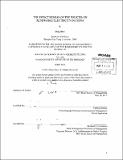The effectiveness of the policies on renewable electricity in China
Author(s)
Xiao, Qing S.M. Massachusetts Institute of Technology
DownloadFull printable version (2.291Mb)
Other Contributors
Sloan School of Management.
Advisor
Yasheng Huang.
Terms of use
Metadata
Show full item recordAbstract
After the legislation of the Renewable Energy Law, China's government established a series of policies to promote renewable energy source electricity (RES-e) from 2005-2012. The effectiveness of the policies varies depending on different perspectives of different stakeholders. Explaining this phenomenon, this research comprises interviews of industry experts, references to previous studies, case studies and data exploration. The renewable policies of China focused more on supply side than demand side. Indeed, China built up its capacity in manufacture of renewable energy equipment and in generation of RES-e under its policies over a short period of time. However, the lack of the involvement of consumer incentives hindered the further growth of RES-e industry. The renewable policies indicate the institutional shortcomings of China's government on designing economic growth policies. This study concludes that policies are more effective to the sustainable development of an industry when set on the demand side than on the supply side. China's government needs to shift its focus on fast short-term growth of supply to long-term growth of local demand.
Description
Thesis (S.M.)--Massachusetts Institute of Technology, Sloan School of Management, 2013. Cataloged from PDF version of thesis. Includes bibliographical references (p. 46-47).
Date issued
2013Department
Sloan School of ManagementPublisher
Massachusetts Institute of Technology
Keywords
Sloan School of Management.